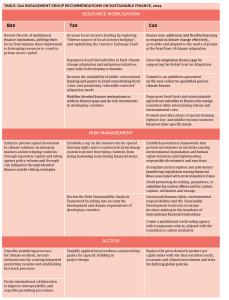The sustainable finance agenda and G20’s engagement groups
A study maps how the Think20, Civil20 and Business20 addressed sustainable finance under Brazil’s G20 presidency, highlighting key convergences and disagreements
The G20 Sustainable Finance Working Group was established in 2021, evolving from earlier climate change initiatives announced by the G20 since their 2009 Pittsburgh Summit. In its current institutional form, the working group aims to align financial systems with the Sustainable Development Goals. Under Brazil’s G20 presidency, the group is co-chaired by China and the United States.
I have conducted a mapping exercise on how three of the G20’s engagement groups – the Think20, the Civil20 and the Business20 – addressed sustainable finance during Brazil’s presidency. This is part of a broader study to understand the formulation of the sustainable finance agenda within the G20 and the influence of various social and interest groups. Sustainable finance encompasses regulations, policies and financial instruments aimed at aligning financial systems with the SDGs, particularly concerning climate change. This includes mobilising resources for international goals, managing environment-related financial risks and enhancing access to sustainable finance for climate adaptation and resilience.
The accompanying table summarises the policy actions recommended by each group. The exercise reveals that the sustainable finance agenda is relatively widespread among the engagement groups. In the case of the T20, three of the six task forces produced recommendations related to the issue. For the C20, two of the six working groups focused on the topic. The B20 recommendations were made by one of the four task forces. T20 and B20 recommendations focused on resource mobilisation and risk management, while in the case of the B20, they concentrated on risk management mechanisms and access facilitation.
This exercise found significant intersections and divergences among the engagement groups. First, there is a substantial overlap between the T20 and C20 in the areas of resource mobilisation and risk management, which has been strengthened through convergence dialogues between the two groups. Second, there are two points of disagreement between the C20 and B20, regarding the facilitation of permits for infrastructure investments and the use of de-risking instruments. This exercise has allowed for the identification of both areas of convergence and disagreement among the engagement groups.













